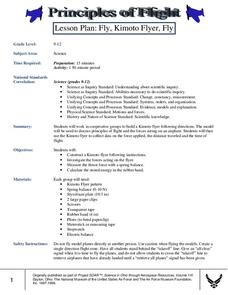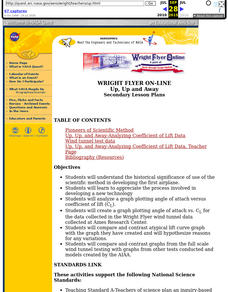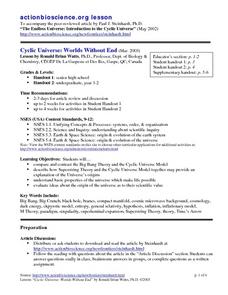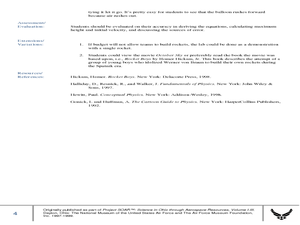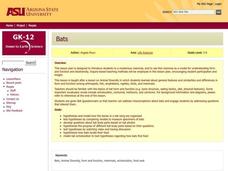NASA
Developing an Investigation
Watch as your class makes the transition from pupils to researchers! A well-designed lesson has scholars pick a solar wind characteristic to research. They then collect and analyze official data from the LANL website. This is the third...
American Institute of Architects
Architecture: It's Elementary!—Fifth Grade
Young citizens construct an understanding of urban planning in this cross-curricular unit. Covering every aspect of city development from the political, economic, and social influences to sustainable building practices, this 10-lesson...
University of Minnesota
Beautiful Brain: Step Inside the Brain
Before digital microscopes, scientists hired artists to draw the things visible in the microscope. Through training in neuroscience and art, Cajal revolutionized the way we view the beautiful brain. The third lesson in a series of four...
Curated OER
Principles of Flight
High schoolers explore the principles of flight. In this flight activity, students construct a model plane and investigate the forces acting on the flier. They will measure the thrust and calculate the stored energy.
Curated OER
Untitled Document Aerospace Team Online:
Students explain the historical significance of use of the scientific method in developing the first airplane and appreciate the process involved in developing a new technology.
Curated OER
The Flame and the Atom:
Students investigate the structure of atoms. Students read information about the Rutherford model, the Bohr model, and the Quantum Mechanical model examining each for its scientific validity. They watch a PowerPoint presentation of alpha...
Curated OER
Heating Crystals
Learners examine the effects of heating on various crystals. They formulate and revise scientific explanations and models using logic and evidence. Students work individually during this experiment.
Curated OER
Creeping
Young scholars observe, measure, and graph a model of slow down slope movement representing soil creep. This task assesses students' abilities to collect, record, and organize data, set up graph axes, plot data points, draw line graphs,...
Curated OER
Tadpoles
Young scholars examine tadpoles at various stages of development. They make careful scientific observations and compare the changes that occur at five different phases of a frog's life.
Curated OER
Cyclic Universe: Worlds Without End
Students compare and contrast the Big Bang Theory and the Cyclic Universe Model. They explain basic properties of the univers which make life possible. They evaluate ideas about the origin of the universe as to their scientific value.
Curated OER
Understanding the Indoor Environment: The Movement of Air
Young scholars discuss HVAC to assess prior knowledge. Students create a rubric to assess their modals of HVAC units, and build the models according to instructions and discussion by the teacher.
Curated OER
Clouds
Third graders complete various activities about clouds. They create a cloud in a lab, write a cloud story, make a cloud model and complete a webquest.
Curated OER
Exploring the MapleCopter
Study explore the motion of maple seeds and design experiments to explain their spinning flight patterns. They make observations, explain ideas of motion, use models, analyze previous reports and experiments, identify relevant factors...
Curated OER
Changing Rocks
Young scholars shake a box containing Plaster of Paris "rocks", gravel, and sand, to measure the effects of erosion. They work individually during this exercise. This task assesses students' abilities to make simple observations,...
Curated OER
Peat Pots
Students place a peat pot in water to observe and calculate the rate of capillarity in a model of a soil. This task assesses students' abilities to make simple observations, collect, record, and represent data, use a data table to...
Curated OER
Rockets: Kinematics or Energy?
Students construct model rockets, measure and record the height of the launch. In this creative lesson students use different methods to calculate velocity and height data from their launched rockets.
Curated OER
Window Gardens
High schoolers use a plastic sandwich bag containing a damp paper towel taped to a window as a model system to observe the germination and early growth of radish seeds. They are challenged to pose a question about seed germination and...
Curated OER
The Fault Line
Students use cardboard models of the North American and Pacific plates and sand to investigate what happens when there is an earthquake or movement along the boundaries of the plates.
Curated OER
Bats
Students model how the bones in a bat wing are organized. They develop questions about bat body parts based on photographs. They hypothesize how bats locate their food.
Curated OER
Classification of Animals
Sixth graders examine two-way classification systems using four mutually exclusive groups and two dimensions simultaneously. They then are given a set of plastic animals, asked to create a two-way classification system, then asked to...
Curated OER
Heating Crystals
Students examine the effects of heating on various crystals. They answer questions in the observation category which assess their ability to use a variety of senses to observe data in a certain way- a scientific way.
Curated OER
Crustal Sinking
Students measure the rate of sinking of a test tube into a beaker of "glop", representing a model of the interaction between the Earth's crust and upper mantle. This task assesses students' abilities to make simple observations,...
Curated OER
Volcano!-Thar She Blows!
Young scholars describe how volcanoes are formed. They name the types of boundaries where volcanoes occur. They utilize models to illustrate the occurence of volcanoes and earthquakes along plate boundaries. They compare and constrast...
Curated OER
River Planning
Students use a model to conduct an experiment involving dam construction. Based on their observations, they draw conclusions about social, economic, and and environmental issues and make a decision concerning dam location. As a group,...





